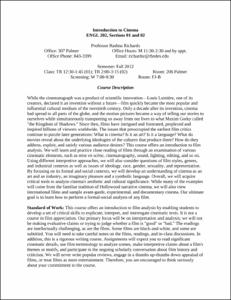Please use this identifier to cite or link to this item:
http://hdl.handle.net/10267/15191| Title: | ENGL 202-02, Introduction to Cinema, Fall 2012 |
| Authors: | Richards, Rashna |
| Keywords: | English, Department of;Syllabus;Academic departments;Text;2012 Spring |
| Issue Date: | 22-Aug-2012 |
| Publisher: | Memphis, Tenn. : Rhodes College |
| Series/Report no.: | Syllabi CRN;13118 |
| Abstract: | While the cinematograph was a product of scientific innovation—Louis Lumière, one of its creators, declared it an invention without a future—film quickly became the most popular and influential cultural medium of the twentieth century. Only a decade after its invention, cinema had spread to all parts of the globe, and the motion pictures became a way of telling our stories to ourselves while simultaneously transporting us away from our lives to what Maxim Gorky called "the Kingdom of Shadows." Since then, films have intrigued and frustrated, perplexed and inspired billions of viewers worldwide. The issues that preoccupied the earliest film critics continue to puzzle later generations: What is cinema? Is it an art? Is it a language? What do movies reveal about the underlying ideologies of the cultures that produce them? How do they address, exploit, and satisfy various audience desires? This course offers an introduction to film analysis. We will learn and practice close reading of films through an examination of various cinematic elements, such as mise en scène, cinematography, sound, lighting, editing, and so on. Using different interpretive approaches, we will also consider questions of film styles, genres, and industrial contexts as well as issues of ideology, race, gender, sexuality, and representation. By focusing on its formal and social contexts, we will develop an understanding of cinema as an art and an industry, an imaginary pleasure and a symbolic language. Overall, we will acquire critical tools to analyze cinema's aesthetic and cultural significance. While many of the examples will come from the familiar tradition of Hollywood narrative cinema, we will also view international films and sample avant-garde, experimental, and documentary cinema. Our ultimate goal is to learn how to perform a formal-social analysis of any film. |
| Description: | This syllabus was submitted to the Office of Academic Affairs by the course instructor. Uploaded by Archives RSA Josephine Hill. |
| URI: | http://hdl.handle.net/10267/15191 |
| Appears in Collections: | Course Syllabi |
Files in This Item:
| File | Description | Size | Format | |
|---|---|---|---|---|
| 2012_FALL_ENGL_202_02_13118.pdf | 226.33 kB | Adobe PDF |  View/Open |
Items in DSpace are protected by copyright, with all rights reserved, unless otherwise indicated.